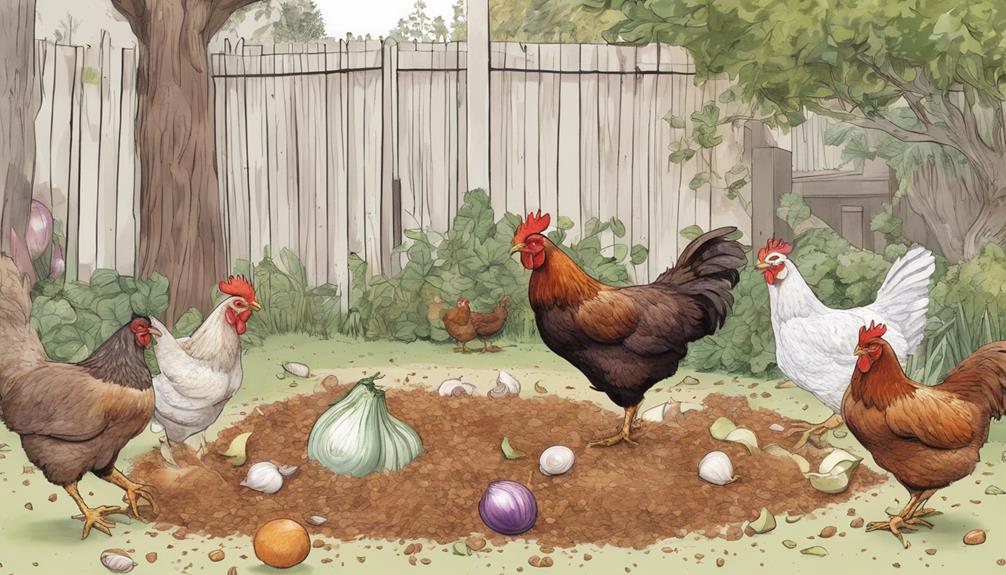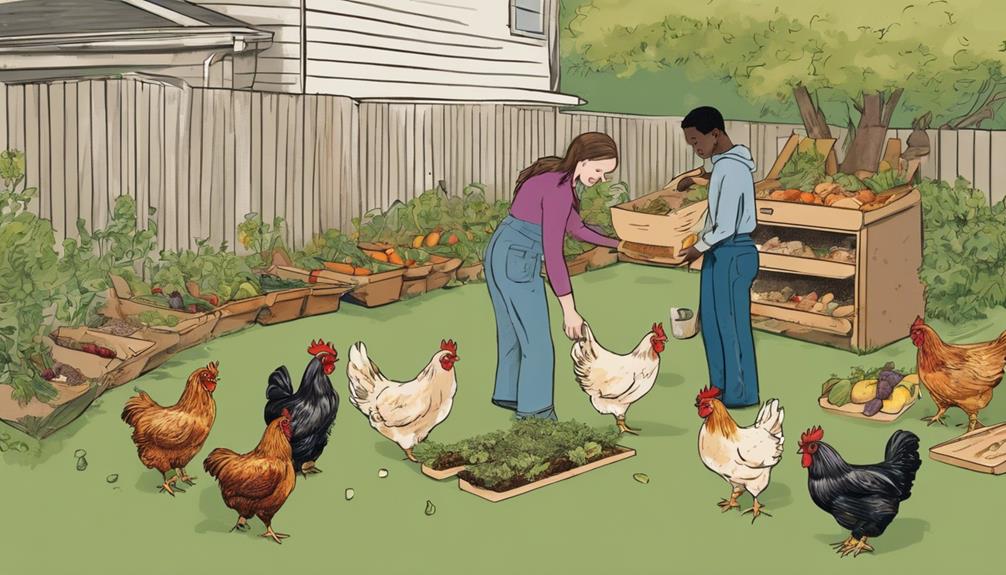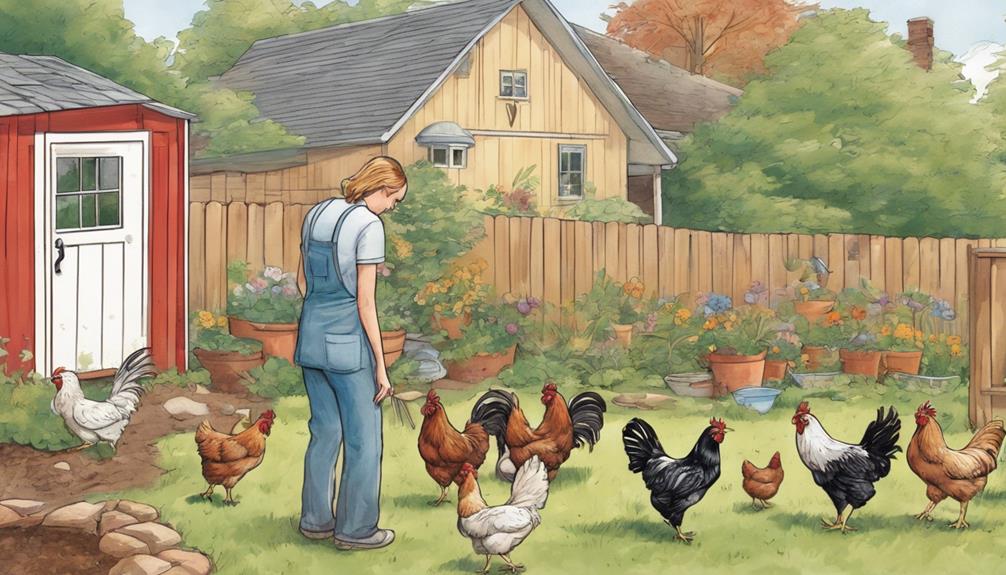You might not know that feeding your backyard chickens kitchen scraps isn't just about clearing out your leftovers; it's an art that balances their nutritional needs with waste reduction.
When you start incorporating scraps like vegetable peels, fruit cores, and leftover grains into their diet, you're not only treating them but also contributing to a sustainable lifestyle.
However, there's a fine line between what's beneficial and what could be harmful to your feathered friends. To ensure you're enhancing their health rather than compromising it, you'll want to stay informed about the dos and don'ts of scrap feeding.
This knowledge can transform your approach and make your backyard coop a happier, healthier place.
Key Takeaways
- Limit kitchen scraps to 10% of chickens' diet, prioritizing high-quality feed for essential nutrients.
- Offer safe scraps like fruits, vegetables, grains, and protein, avoiding toxic foods like avocado and chocolate.
- Cut larger scraps into smaller pieces to prevent choking and ensure they are fresh and clean.
- Monitor chickens' health and egg quality after introducing scraps, removing uneaten food to prevent spoilage.
Understanding Chicken Diets
To ensure your backyard chickens thrive, it's vital to understand that they're omnivores requiring a balance of protein, carbs, fats, vitamins, and minerals. A well-rounded chickens diet is the cornerstone of their health and egg-laying capabilities. When feeding chickens, it's important to start with a high-quality layer feed, which covers the essential nutrients, including calcium and phosphorus for strong eggshells.
Kitchen scraps can be a great way to reduce food waste and add variety to your chickens' diet. However, these scraps should complement, not replace, their primary feed. This approach ensures they're getting the full spectrum of nutrients needed without causing dietary imbalances. Be cautious and informed about what you're tossing into their coop; not all kitchen scraps are safe for chickens.
Moreover, there are specific foods you should absolutely avoid feeding your chickens due to their toxic nature, such as raw potatoes, avocados, and chocolate. These can harm your flock, leading to health issues and potentially reducing egg production. Understanding what to feed and what to avoid is key to maintaining a healthy, productive backyard chicken coop.
Safe Kitchen Scraps
After understanding the basics of chicken diets, let's explore which kitchen scraps are safe for your backyard flock. Feeding your chickens kitchen scraps can't only reduce waste but also provide them with a varied and balanced diet. However, it's crucial to know which scraps are safe to feed your feathered friends.
Here are a few safe options that can be beneficial:
- Fruits and Vegetables: Apples, berries, lettuce, and kale are great. They offer vitamins and hydration, especially during hot weather.
- Grains and Dairy: Cooked rice, oatmeal, cheese rinds, and leftover milk can supplement their diet with essential nutrients.
- Protein Sources: Bread scraps, cooked meats cut into small pieces, and crushed eggshells for calcium can be great additions.
It's important to remember that these kitchen scraps should only complement their feed, ensuring they receive a balanced diet. By incorporating a variety of safe kitchen scraps in moderation, you're not only making use of leftovers but also contributing to the health and happiness of your chickens. Always cut larger items into smaller, manageable pieces to prevent choking and ensure that all members of your flock get a share.
Dangerous Foods to Avoid

While you might be eager to share your kitchen scraps with your backyard chickens, it's crucial to know which foods can pose serious risks. Certain items, such as avocado skins and pits, along with anything from the nightshade family, can be deadly.
It's essential to steer clear of these and other harmful foods to ensure the health and safety of your flock.
Toxic Foods List
Feeding your backyard chickens the wrong kitchen scraps can be harmful, so it's crucial to know which foods to avoid. Among the variety of kitchen scraps you might consider offering your feathered friends, some can actually endanger their health. These toxic foods can cause serious illness or even be fatal. To ensure the safety and well-being of your chickens, steer clear of the following:
- Caffeine and chocolate: Both contain substances that are toxic to chickens, posing serious health risks.
- Raw meat: This can introduce harmful bacteria into your chickens' diet, leading to illness.
- Highly processed foods: These often contain high levels of salt and other additives that are unhealthy for chickens.
Unsafe Kitchen Scraps
To ensure your backyard chickens stay healthy, it's vital to avoid certain dangerous kitchen scraps. Avocado skins and pits should be avoided due to the toxic substance persin. Avocado isn't the only hazard in your kitchen. Caffeine-containing items like coffee grounds, tea, and soda can be toxic to your flock. They don't mix well with caffeine, and it's best to keep these items out of their reach.
Chocolate is another big no-no. It contains theobromine, which is harmful to birds, making it a risky treat. Additionally, steer clear of nightshade family plants such as tomatoes, potatoes, and peppers. While the fruit might be safe in small quantities, their leaves are toxic to chickens, posing a significant health risk.
Health Hazard Foods
You should also steer clear of alcohol, as it's toxic to chickens and can severely impact their health. While you might think offering meat scraps, fruits, and vegetables might be a healthy addition to their diet, it's crucial to know not all are safe.
For instance, coffee grounds, seen as harmless compost material, are harmful due to their caffeine content.
- Avocado skins and pits: Contain persin, a fatal toxin.
- Nightshade family foods: Tomatoes, potatoes, and pepper leaves/stems are toxic.
- Chocolate: Contains theobromine, which is toxic to chickens.
Proper Scrap Feeding Techniques

When offering kitchen scraps to your backyard chickens, it's crucial to ensure they make up no more than 10% of their diet to maintain balanced nutrition. Feeding your chickens scraps in the afternoon, after they've had their main feed, is a good way to cut down on waste while ensuring they're not filling up on less nutritious food. Chickens love a variety of foods, including cooked meat and vegetable scraps, which can provide them with additional nutrients.
Ensure that all scraps are fresh, clean, and free from mold or contaminants. It's important to monitor how these treats affect the egg quality and the overall health of your chickens. Collect any uneaten scraps promptly to prevent spoilage and keep the coop clean.
To paint a clear picture, here's a simple guide:
| Do | Don't |
|---|---|
| Feed scraps in the afternoon | Offer more than 10% of diet as scraps |
| Ensure scraps are fresh and clean | Feed moldy or contaminated scraps |
| Monitor egg quality and health | Leave uneaten scraps to spoil |
| Offer a variety of scraps | Rely on scraps as a main food source |
Benefits of Recycling Kitchen Waste
Recycling kitchen scraps for your backyard chickens not only cuts down on household waste but also supports a sustainable lifestyle. By integrating this eco-friendly practice into your routine, you're contributing significantly to food waste reduction and promoting environmental sustainability. It's a simple yet impactful way to make a difference right from your home.
Here's how recycling kitchen waste benefits both you and your chickens:
- Sustainability: Feeding your chickens kitchen scraps is a step towards a more sustainable and eco-friendly lifestyle. It reduces the need for commercial feed and minimizes your carbon footprint.
- Enrichment: Offering a variety of kitchen scraps adds excitement and nutritional enrichment to your chickens' diet, keeping them healthy and happy.
- Cost-effective: Utilizing leftovers as part of your chickens' diet can significantly cut down on feed costs, making it a practical solution for poultry owners looking to economize.
Incorporating kitchen waste into your chickens' diet not only contributes to a more sustainable world but also enriches your chickens' lives and saves you money. It's a win-win situation that aligns with eco-friendly practices and supports food waste reduction.
Monitoring Chicken Health

As you feed your backyard chickens kitchen scraps, it's crucial to keep an eye on their health.
You'll need to regularly check for any signs of illness and ensure they're maintaining a healthy weight and appearance.
Identifying health issues early and conducting routine health checks are key to keeping your flock thriving.
Identifying Health Issues
To ensure your backyard chickens remain healthy, it's vital to monitor their behavior, droppings, feather condition, and appetite closely. Observing these aspects of your chickens can provide early warning signs of illness that you shouldn't ignore. It's all about keeping a keen eye on their daily habits and any deviations that might indicate a problem.
Here are a few key points to remember:
- Look for signs of illness such as lethargy or unusual vocalizations.
- Regularly check for parasites, like mites and lice, on their bodies and in the coop.
- Consult a veterinarian if you notice persistent issues or if you're unsure about any symptoms.
Regular Health Checks
Conducting regular health checks on your chickens is crucial for catching any signs of illness or distress early on. While feeding them kitchen scraps, be attentive to their behavior, feather condition, and overall appearance. This proactive approach ensures any abnormalities, including changes in egg production, are addressed promptly.
| Aspect | Healthy Sign | Concerning Sign |
|---|---|---|
| Behavior | Active, good appetite | Lethargy, poor appetite |
| Feather Condition | Well-groomed | Ruffled, missing feathers |
| Egg Production | Consistent | Sudden changes |
Regular examinations are key. If you spot any worrying signs, it's time to seek veterinary care. Remember, early detection through health checks can make a significant difference in your chickens' well-being, especially when they're enjoying a varied diet of kitchen scraps.
Conclusion
By feeding your backyard chickens kitchen scraps, you're not only giving them a treat but also significantly reducing food waste. Remember, it's crucial to know what's safe and what's not. Stick to fruits, vegetables, grains, and cooked meats, and always avoid toxic foods.
Use moderation and balance to keep your chickens healthy. This practice benefits both your feathered friends and the environment. Keep an eye on their health and enjoy the perks of a happy, sustainable backyard flock.